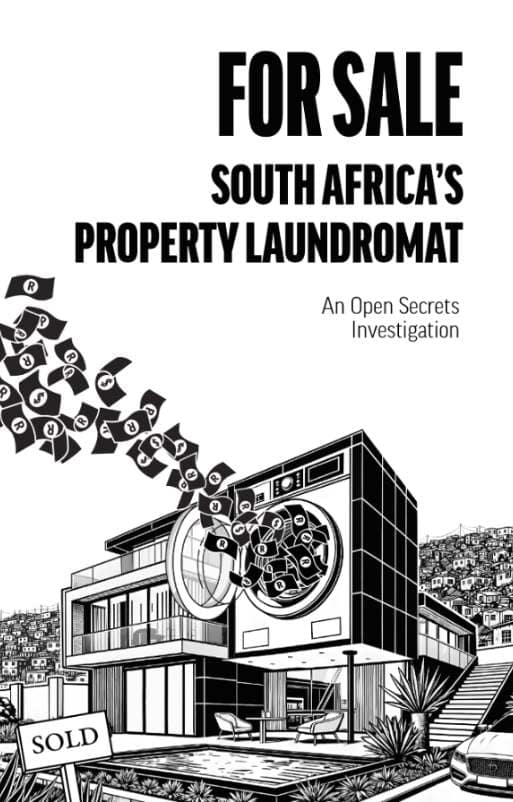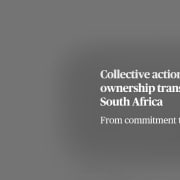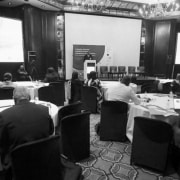|
Getting your Trinity Audio player ready...
|
Image: Wikimedia Commons
Lawyers, real estate agents, bankers. These are some of the private sector players that have enabled Africa’s political elite to freely engage in alleged gross money laundering and illicit property dealings in the luxury property market in some of South Africa’s most sought-after locations.
Their complicity, say civil society organisations, means that well-meaning procedures meant to protect the country’s governance systems are compromised, and there is a reputational threat to South Africa, which is currently battling to come out of grey-listing.
From a socio-economic viewpoint, the continuous abuse of financial and real estate sector principles means that the inequality gap in South Africa is perpetuated, leaving the landless masses in an even more desperate situation, while the wealthy and politically connected continue to abuse systems meant to prevent wrongdoing.
Civil society organisation Open Secrets recently released a report titled For Sale: South Africa’s Property Laundromat, which details how luxury real estate in South Africa has become a haven for laundering funds linked to land corruption across Africa. It lists cases involving the political elite in Mozambique, the Democratic Republic of Congo (DRC), and Equatorial Guinea, and highlights transactions in high-end property deals that they have been involved in for years.
From the Selemanis and Kabila families of the DRC to the relatives and associates of Mozambique’s former presidents Armando Guebuza and Filipe Nyusi, the report records how just over R161-million has exchanged hands between these politicians and their associates as they snap up properties, in some cases using shell companies. This with the help of conveyancers, bankers and real estate agents, and without much accountability.
Ra’eesa Pather, investigator at Open Secrets and co-author of the report, highlighted the importance of understanding how South Africa’s grey-listing by the Financial Action Task Force did not happen by chance, but that the lack of vigilance and accountability for the politically elite means that processes that are meant to protect the reputation and integrity of South Africa’s governance systems are compromised.
“The reason why we thought it was so important to do this report is that we felt that the lawyers, the estate agencies and other private institutions were not being closely scrutinised enough for their role in the grey-listing and supporting and enabling money laundering crimes,” Pather said.
Due diligence
South Africa’s Financial Intelligence Centre Act (FICA) requires real estate agents or any other private entities that facilitate property sales to conduct due diligence exercises specifically designed for this sector in the context of preventing money laundering and other financial crimes.
The report notes: “The FICA does not provide a specific definition of due diligence, but the FIC [Financial Intelligence Centre] describes it as a ‘risk-based approach’ that requires accountable institutions ‘to understand their exposure to money laundering and terrorist financing risks’.”
An example of due diligence includes verifying a client’s identity, the business’s beneficial ownership and source of funds, and understanding any links to corruption or other unlawful activities. The FICA states that all accountable institutions must do due diligence on their clients before agreeing to do business and continue to do so for the duration of their business together.
When dealing with foreign PEPs [politically exposed persons], the FICA has specific due diligence requirements for lawyers, estate agents, and other accountable institutions, which include the following:
- The business’s senior management must approve the PEP becoming a client;
- The business must take reasonable measures to establish the PEP’s source of wealth and source of funds; and
- It must monitor the business relationship on an ongoing basis.
Institutions that fail in their due diligence or do not keep records are considered non-compliant with FICA and face administrative sanction, usually in the form of a fine. Those institutions that fail to report suspicious transactions are also non-compliant and face such administrative sanction. However, if an individual fails to make a suspicious transaction report, then they are guilty of an offence.
The organisation further acknowledges that: “It is unclear if the banks, lawyers, and estate agents discussed in this report submitted suspicious transaction reports with respect to their dealings with PEPs from Mozambique, the DRC, and Equatorial Guinea. What we do know is that the transactions continued to be processed, despite the red flags for money laundering that should have triggered action.”
Circumventing procedure
Open Secrets has found some of South Africa’s well known real estate companies complicit in enabling the use of cash from by these foreign politicians to buy property locally.
Pather revealed how companies such as Pam Golding, which is named in the report along with Re/Max, have done business with several of these politicians.
Another investigator of Open Secrets and co-author of the report, Abby May, told how major law firm Cliffe Dekker Hofmeyr (CDH) defended its position in responding to Open Secrets’ questions on their due diligence processes in vetting the Selemanis in relation to a multi-million rand property. May said in their response, CDH told Open Secrets that it was common practice in property sales involving foreigners to use shell companies. The response is documented in the report.
Frances Selimani is the adopted brother of former DRC president Joseph Kabila. He and his wife Aneth Lutale are reported to have purchased 13 properties in Gauteng between 2016 and 2018. The report notes: “This was around the period when Selemani’s DRC businesses—namely a company called Sud Oil and an infamous bank known as BGFIBank DRC (Banque Gabonaise et Française Internationale DRC)—were laundering public funds through a network of companies owned by Selemani and Lutale.
“Information about the Kabila family’s laundromats emerged in 2021, when the Congo Hold-Up leaks released millions of banks records from BGFIBank DRC showing illicit transactions that implicated Selemani and others in the family and their networks.”
Socio-economic impact
Cape Town-based movement Reclaim the City has decried the lack of urgency from government in curbing the scourge of money laundering in the Cape Town property market. It argues that these transactions happen against the backdrop of a dire lack of housing for the poor in the city. Karen Hendricks, one of the co-founders, said authorities often overlook the needs of the poor in the city of Cape Town even criminalising those who lack housing without understanding and acting on the cases of property grabbing that happens at high level.
Over 600 000 people await government-subsidised housing in the Western Cape city and yet provision is made for these foreign politicians to secure their wealth, often obtained through ill-gotten gains, by buying luxury property without any accountability to their own countries or to law enforcement agencies in South Africa.
“When you speak about property for the most vulnerable, we speak of land, and land for living. It is sad that in Cape Town people are actually being criminalised for occupying or living in informal settlements. The government is saying there is no land and they’re also saying there is no money to build housing.
“People die waiting for housing, and here’s someone who just comes into the country, buys prime property, when there are so many who are in need of housing. We need well-located housing so that they can be close to places of work.”
Isiah Mumbilo from the Congolese Civil Society concurred, noting that the limitations are even more dire for refugees and asylum seekers from other African countries, living in South Africa. He told of the typical experience of a Congolese refugee who is protected by the Constitution, but has limited access to basic services such as decent housing, and whose dignity and sense of self-reliance is affected by such circumstances.
The property sector excludes this grouping, and there is no recourse. “This is the impact of money laundering from home to the country you run to, because you start paying the price. It’s like the money laundering system cursing us wherever we go.”
He added that there’s little room for ordinary citizens in the DRC to publicly oppose policies of government without facing persecution, and that enables rampant corruption an abuse of power by senior government officials, that leads to people in that country fleeing to other countries like South Africa.
What now?
Pather says it is important that law enforcement agencies in South Africa pick up the baton and reverse the damage caused by money laundering and other financial crimes. “Law enforcement agencies in South Africa should seize these assets while they’re still in the hands of these perps so that the money can be recovered put back and brought back to where it belongs.”
Recommendations contained in the report include:
- Investigate and seize the assets – The National Prosecuting Authority and its Asset Forfeiture Unit must take steps to investigate assets owned by politically exposed persons with a corrupt track record and seize them where necessary. It is especially critical that these properties are seized before PEPs sell them and the money becomes untraceable.
- Effectively sanction negligent agencies – banks, lawyers, and estate agencies have clear responsibilities under the Financial Intelligence Centre Act in South Africa. Failure to perform the necessary know-your-customer checks, or to submit suspicious transaction reports and meet other obligations, should result in effective sanction. This should include not only sanction by the FIC but also possible criminal investigation by the Hawks if the criminal threshold is met.
- Repatriate the money – Any proceeds from corrupt asset seizures should be returned to the home nation where the money was looted. Returned assets must be used to fund public goods and services.
- Train and support accountable institutions – If small business estate agencies and law firms are struggling to understand their FICA obligations and do not have the resources available to be compliant, then the FIC must respond swiftly to the gaps in the sector, so that money laundering and other corrupt activities can be prevented.
- Make cities liveable for all – PEPs own property where they gain prestige and stature for owning assets. It strokes their egos. But when cities become desirable for PEPs, the cost of living goes up for everyone, making homes unaffordable for locals, low-income migrants, and other marginalised communities. Local governments are in charge of property taxes and other policies that impact on people’s homes. They must develop and implement policies – including social and affordable housing, and property taxes – that make cities more accessible and just.









